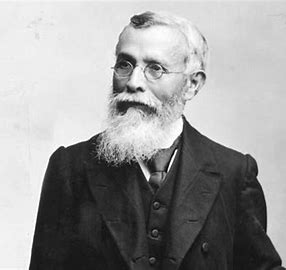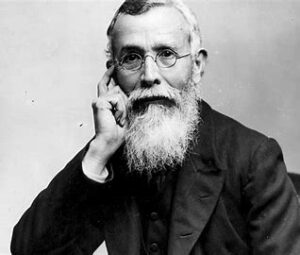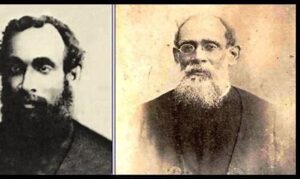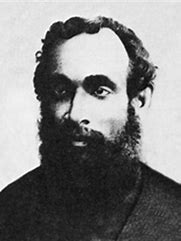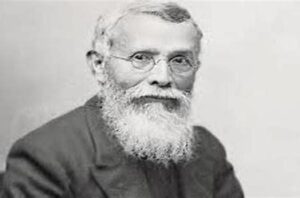Surendranath Banerjee was a prominent political figure and nationalist movement leader in the late nineteenth and early twentieth centuries. He was a prominent member of the Indian National Congress (INC) and contributed significantly to the fight for Indian independence.
On November 10, 1848, Banerjee was born in Bengal, India. He was well-known for supporting Indian nationalism and working to advance Indian interests in the nation under British administration. Banerjee was a fervent advocate for education and thought that political consciousness and education might empower Indians.
He was one of the Indian National Congress’s original founders and served as its president twice, in 1895 and 1902. Banerjee emphasized the need of granting Indians more autonomy over national policy and the need of self-governance.
Banerjee’s dedication to promoting Indian rights, calling for more participation of Indians in the civil services, and fighting repressive British policies characterized his political career. He highlighted the complaints of the Indian people under British rule and rallied support for nationalist movements through speeches and media.
His efforts to unite Indians from diverse communities and regions had a significant influence on the movement’s early growth. On August 6, 1925, Banerjee departed from this life, leaving a legacy of unwavering devotion to the Indian liberation movement and the development of Indian interests in politics.
Biography:
Early Life:
On November 10, 1848, Surendranath Banerjee was born in Calcutta, India (now Kolkata). He was educated well in Sanskrit and English and hailed from a well-known Bengali family.
Educational Contributions:
Banerjee fervently supported education. In 1882, he established the Ripon College in Calcutta with the goal of giving Indians access to a modern education. He also established the Indian National Association in 1876 with the intention of advancing political awareness and reform through education.
Founding of Indian National Association:
In 1876, Banerjee co-founded the Indian National Association, one of the earliest political organizations in British India. Its goals included promoting political changes and increased Indian participation in the British government.
Role in the Ilbert Bill Controversy:
Banerjee was a major opponent of the contentious Ilbert Bill of 1883, which sought to give Indian judges the authority to hear matters involving British subjects living in Europe. Through her campaigning against the bill, Banerjee brought attention to the unfair treatment of Indians during British colonial rule and racial prejudice.
Indian National Congress:
One of the original members of the Indian National Congress (INC), which was founded in 1885, was Banerjee. Twice, in 1895 and 1902, he presided over the INC as president. His guidance influenced the INC’s initial objectives and plans of action as it pursued Indian self-governance.
Advocacy for Civil Rights:
Banerjee was a fervent supporter of Indians’ political and civil rights. He advocated for the rights of Indians under British rule by using his position as a speaker and journalist.
Prominent Journalist:
He served as editor of a number of prestigious periodicals and publications, such as “The Bengalee” and “The Nation.” His literary works disseminated nationalist concepts and motivated a cohort of Indians to partake in the liberation struggle.
Relationship with the Indian National Congress:
The relationship between Banerjee and the Indian National Congress (INC) was complicated. Despite being one of the INC’s founding leaders, he eventually severed ties with the group because of ideological disagreements and divergent approaches to attaining Indian self-rule.
Moderates vs. Extremists:
Within the INC, radicals who favored more severe forms of agitation and protest were opposed to moderates like Banerjee. Banerjee was a moderate who supported peaceful and constitutional ways to bring about political change.
Social Reforms:
Banerjee was active in a number of social reform movements in addition to politics. He was in favor of things like ending child marriage, widow remarriage, and women’s education.
Opposition to Partition of Bengal:
When Lord Curzon advocated dividing Bengal in 1905, Banerjee was a strong opponent. He was the leader of the Swadeshi Movement, which advocated utilizing Indian-made items as a means of protesting the partition and calling for a boycott of British goods.
Swadeshi Movement:
Banerjee actively participated in the Swadeshi Movement, which encouraged Indians to boycott British goods and promote Indian-made products. This movement aimed at achieving economic self-sufficiency and self-reliance.
Legal Career:
Banerjee was a successful lawyer and played a crucial role in defending Indian nationalists who were charged with sedition and other offenses by the British colonial authorities.
Later Life:
Banerjee prioritized education in his final years and held the position of vice-chancellor at the University of Calcutta. He continued to promote Indian culture and nationalism through his academic work.
Legacy:
Surendranath Banerjee is remembered as one of the pioneering leaders of the Indian independence movement. His efforts in advocating for political and civil rights for Indians and his role in raising awareness about the injustices of British colonial rule played a crucial role in the larger struggle for India’s freedom.
De*th:
Surendranath Banerjee, a prominent Indian nationalist leader and one of the founding fathers of the Indian National Congress, passed away on August 6, 1925. He played a significant role in the Indian freedom struggle and was known for his efforts to promote political and social reforms in British-ruled India. His death marked the end of an era in the Indian nationalist movement, but his contributions to the struggle for independence are remembered and celebrated to this day.
Facts:
Surendranath Banerjee Newspaper
Surendranath Banerjee was a prominent Indian nationalist leader and a key figure in the Indian independence movement during the late 19th and early 20th centuries. He was a strong advocate for political and social reforms in India under British colonial rule.
Surendranath Banerjee established several newspapers and journals to promote his ideas and to raise awareness about the issues facing India during his time. One of his notable newspapers was “The Bengalee,” which he started in 1879. “The Bengalee” was a Bengali-language newspaper that helped propagate nationalist and reformist ideals in Bengal and beyond India. It was a platform for discussing various political, social, and cultural issues of the time.
Banerjee used “The Bengalee” to voice his opinions on subjects such as the rights of Indians under British rule, the promotion of education, and social reforms. He played a crucial role in inspiring and mobilizing people through his newspaper.
Surendranath Banerjee’s contributions to Indian journalism and his role in the Indian freedom struggle are highly regarded in India’s history. His newspapers, including “The Bengalee,” were instrumental in shaping public opinion and promoting the nationalist cause.
Surendranath Banerjee Indian Association:
Surendranath Banerjee was closely associated with the Indian Association, which was a significant organization in the late 19th and early 20th centuries during the Indian freedom struggle against British colonial rule. The Indian Association was founded in 1876 by Surendranath Banerjee and Ananda Mohan Bose, among others, with the primary objective of advocating for the political rights and interests of Indians under British rule.
The Indian Association aimed to create a platform for Indians to voice their concerns and demands for political and social reforms. It played a crucial role in promoting nationalist sentiments and advocating for civil rights. Some of the key objectives and activities of the Indian Association included:
1. Advocating for Indian representation in the legislative councils.
2. Promoting Indian culture and education.
3. Fostering a sense of unity and solidarity among Indians of different regions and backgrounds.
4. Protesting against discriminatory policies and laws imposed by the British colonial government.
Surendranath Banerjee was a prominent leader of the Indian Association and used it as a platform to engage with British authorities and advocate for Indian rights and representation. He also played a vital role in mobilizing public opinion and galvanizing support for the Indian National Congress (INC). Which eventually became the leading political organization in the fight for Indian independence.
Banerjee’s efforts through the Indian Association contributed significantly to the growth of the nationalist movement in India. Paving the way for future leaders and organizations in the struggle for freedom.
Surendranath Banerjee also known as:
Surendranath Banerjee, also known as Deshbandhu, was a prominent Indian nationalist leader and political figure during the late 19th and early 20th centuries. He was a key figure in the Indian freedom struggle against British colonial rule.
The title “Deshbandhu” is an honorific name that means “Friend of the Nation” and was given to him in recognition of his dedicated service to the cause of Indian nationalism. Surendranath Banerjee played a significant role in the Indian National Congress and was a vocal advocate for India’s rights and freedoms. He was known for his efforts to promote political unity among Indians and for his emphasis on the importance of education in fostering national consciousness.
Surendranath Banerjee’s contributions to the freedom movement and his advocacy for the rights of Indians earned him a lasting place in India’s history as one of its prominent nationalist leaders.
Civil Service:
Surendranath Banerjee was an influential Indian nationalist leader and one of the prominent figures in the Indian National Congress during the late 19th and early 20th centuries. While he is best known for his role in the Indian nationalist movement, he also had a career in the civil services.
Surendranath Banerjee was born on November 10, 1848, in Calcutta (now Kolkata), India. He passed the Indian Civil Service (ICS) examination in 1869 and became one of the early Indian members of the civil services during the British colonial period. He served as a civil servant in the government for a brief period but resigned from the ICS in 1874, citing dissatisfaction with British colonial policies and a desire to participate in the political and social reform movements of the time.
After leaving the civil services, Surendranath Banerjee became deeply involved in various social and political causes. He played a pivotal role in the Indian National Congress (INC) and became one of its leading voices in the late 19th century. He advocated for greater Indian representation in government and was a staunch supporter of civil rights and political reforms.
Banerjee’s political career was marked by his efforts to unite different sections of Indian society, and he worked to bridge the gap between the moderate and extremist factions within the INC. He was known for his eloquent speeches and writings, which helped mobilize public opinion against British colonial rule.
Surendranath Banerjee’s contributions to the Indian freedom struggle and his dedication to the cause of Indian self-rule made him a respected figure in Indian history. He passed away on August 6, 1925, leaving behind a legacy of political activism and a commitment to civil service in the service of his country.
Family:
Surendranath Banerjee was a prominent Indian nationalist leader and a key figure in the Indian independence movement during the late 19th and early 20th centuries. While I don’t have specific information about his family members, I can provide some general information about his life.
Surendranath Banerjee was born on November 10, 1848, in Calcutta, British India (now Kolkata, India). He came from a middle-class Bengali family. He received his education at the University of Calcutta and later went to England to study law. In England, he became active in the civic and political movements of the period, being inspired by terms of liberty and pride.
Upon his return to India, Surendranath Banerjee became a prominent leader in the Indian National Congress and played a significant role in advocating for India’s independence from British colonial rule. He was known for his eloquent speeches and his efforts to unite Indians from different backgrounds and regions in the struggle for freedom.
Banerjee’s family was likely to support his political ambitions, while precise information on his family members may not be available. He was more renowned for his own contributions to the independence movement. August 6, 1925 saw the passing of Surendranath Banerjee, who was one of the pioneers in India’s struggle for independence.
Books:
Surendranath Banerjee was a prominent Indian educator, activist, and leader in the late 19th and early 20th centuries. He made significant contributions to the Indian freedom struggle and the promotion of education in India. While he is primarily known for his political and social work, he also wrote several books and essays on various subjects. Some of his notable books and writings include:
A Nation in the Making:
This book, published in 1925, is considered one of his most important works. It expresses his views on the Indian national movement and the necessity of creating a powerful, cohesive country for India.
Central Hindu College and the New University:
In this pamphlet, Banerjee discussed the establishment of the Banaras Hindu University and the role of education in the development of India.
Life and Speeches of Dadabhai Naoroji:
Banerjee wrote this biography of Dadabhai Naoroji, one of the early leaders of the Indian National Congress and an important figure in the Indian freedom movement.
Self-Government in India:
This book presents Banerjee’s views on self-government for India and the need for Indian representation in the British Parliament.
A Review of Lord Cross’s Education Despatch:
In this work, Banerjee analyzed the Education Despatch of 1899, which outlined the British government’s policy on education in India.
National Council of Education:
Banerjee played a significant role in the establishment of the National Council of Education in Bengal. He wrote about the need for educational reform and the objectives of this institution.

